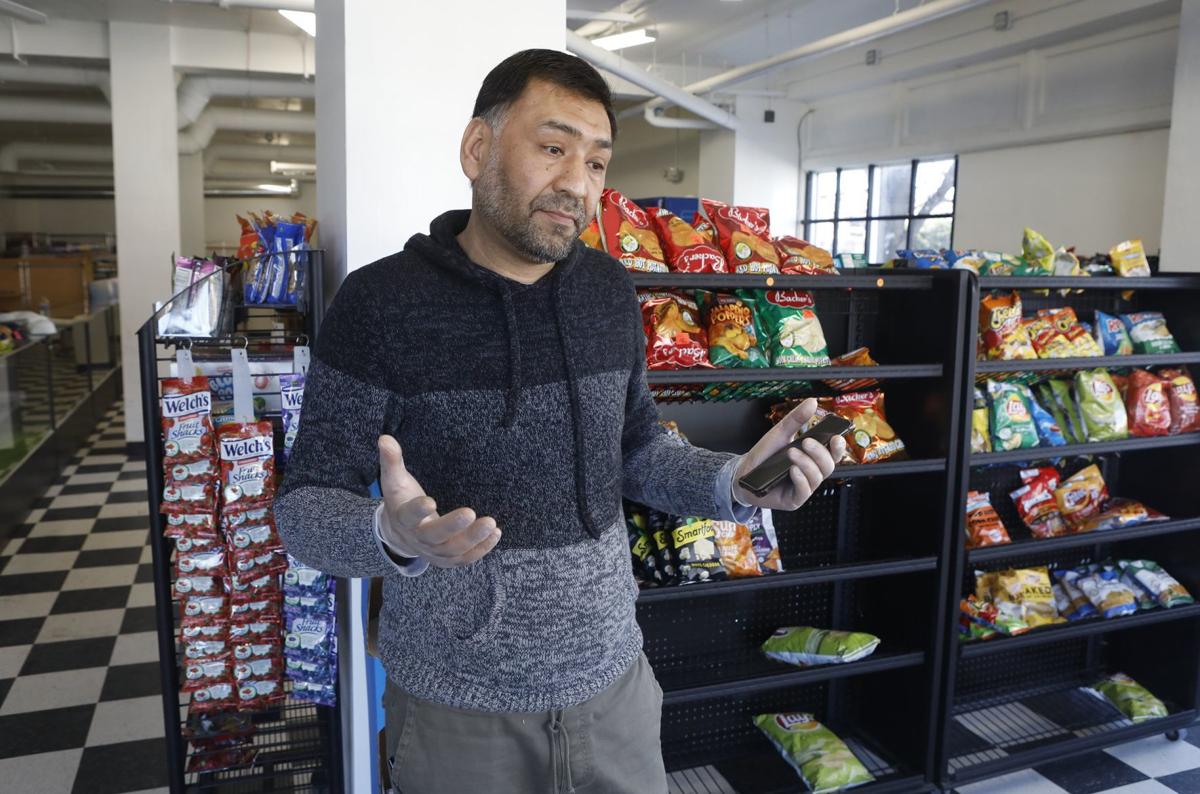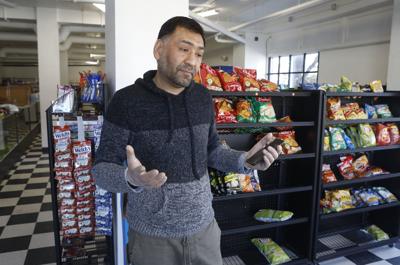LetŌĆÖs start with the ending.
Jawad Rahimi is broke.
ŌĆ£I canŌĆÖt pay my bills,ŌĆØ says the 47-year-old owner of a downtown ├█č┐┤½├Į bodega. ŌĆ£I canŌĆÖt pay my rent. I canŌĆÖt pay anything.ŌĆØ
Rahimi isnŌĆÖt a victim of the coronavirus pandemic, but of bureaucratic bungling.
To understand what happened to him, letŌĆÖs go back to the beginning.
To Azerbaijan, more than a decade ago, where Rahimi was a dentist.
A native of Afghanistan, Rahimi thought he could make a better life for himself in America.
Like generations before him, from Germany, Ireland, Italy and Bosnia, Rahimi followed his dreams to the Gateway City.
He didnŌĆÖt speak English at first, and that shuttered his dreams of continuing in the medical profession. So he got a job in an embroidery shop while he learned English. He became a U.S. citizen. He and his wife had two daughters. TheyŌĆÖre now 9 and 12. They like to draw. Rahimi saved money and opened a local market on Olive Street.
People are also reading…
J.R.ŌĆÖs Market has been a staple of the Downtown West neighborhood for more than a decade.
Then progress came calling. RahimiŌĆÖs store was in a building inside the footprint of the new Major League Soccer stadium to be built by the Taylor family, the local billionaires and owners of Enterprise Holdings. Make no mistake, what happened to Rahimi isnŌĆÖt their fault. But their project became a city priority, with the power of the city bureaucracy moving mountains ŌĆö and small businesses ŌĆö to get the stadium built.
Rahimi was one of several renters in the area who in October. He found a new place for his market down the street on Olive, just outside the footprint of the stadium.
But there was a problem.
City regulations required him to reapply for the liquor license he had held for years with no problems, even though he was just moving his store west a couple of blocks.
ŌĆ£In a perfect world his liquor license would have just been transferred,ŌĆØ said Sixth Ward Alderman Christine Ingrassia, who has tried to help Rahimi navigate the cityŌĆÖs bureaucracy. ŌĆ£But thatŌĆÖs not the way the law is set up.ŌĆØ
City regulations are funny things. They get bent for big projects, or the right people, all the time. Some have even been put on hold by Mayor Lyda Krewson to ease the pain of the coronavirus pandemic. For instance, in late March, the city announced that liquor license renewals would automatically be extended during the pandemic.
That didnŌĆÖt help Rahimi. By March he had obtained all the permits he needed to reopen his store except for one: the new liquor license. He was short one signature, a local landlord he couldnŌĆÖt get to return his calls. But he had the support of the local alderman and even Lewis Reed, the president of the Board of Aldermen.
ŌĆ£As you know, due to the development plans for the new MLS soccer stadium he was forced to move his business to a new, nearby location,ŌĆØ Reed wrote excise commissioner Myles McDonnell. ŌĆ£I am hoping his hearing is a success because he is recognized in the community as a hard-working business owner who is dedicated to downtown.ŌĆØ
On March 18, Rahimi went to the liquor license hearing and pleaded for an exception considering his circumstances. He was one signature short. He was denied a license.
ŌĆ£I cried,ŌĆØ Rahimi said. ŌĆ£I donŌĆÖt have the money anymore to reapply.ŌĆØ
His store is mostly stocked but he canŌĆÖt do any business. People come by and ask about buying liquor and he has to turn them away. He owns one of the businesses that could actually still operate and even thrive during the pandemic, but he doesnŌĆÖt have the permit or the money to continue.
HeŌĆÖs hoping for some sort of city reprieve, considering the circumstances of how he was forced to start over. For the record, Rahimi loves soccer. He grew up playing it all the way to university level.
The new stadium, he says, ŌĆ£will be great for downtown.ŌĆØ
It would be great for his business, too.
Immigrants are helping arrest population decline in urban areas caught on the losing end of an internal U.S. trend.
ŌĆ£├█č┐┤½├Į was a good place to start,ŌĆØ Rahimi told a Reuters reporter a few months ago, who was doing a story about how immigrants were keeping struggling Midwestern cities alive. In the past decade more than 15,000 foreign born residents took root in the city, severely limiting its population decline. Many of them started businesses. Rahimi was a success story. The face of immigration in ├█č┐┤½├Į.
Now, the city Rahimi loves is standing in his way.
His American Dream hangs by a fraying thread.
ŌĆ£They broke me,ŌĆØ he says of the city bureaucracy. ŌĆ£All my hopes are gone. All my dreams collapsed. IŌĆÖve lost everything.ŌĆØ















